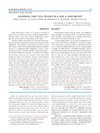Please use this identifier to cite or link to this item:
https://accedacris.ulpgc.es/jspui/handle/10553/105840
| Title: | Palpebral mast cell tumour in a dog. A case report. | Authors: | Mihaela Alexandru, Diana Crivineanu, Maria Morales Fariña, Inmaculada Ferrer Quintana, Otilia Rosa |
UNESCO Clasification: | 310907 Patología 320713 Oncología |
Keywords: | Cancer Mast cell tumour Toceranib Tyrosine kinase inhibitor |
Issue Date: | 2020 | Journal: | Revista Romana De Medicina Veterinara | Abstract: | Mast cell tumour (MCT) is a common cancer in dogs, this type of tumour has a variable biological behaviour which is why the chosen therapeutic management will be different depending on the case.
The aim of this case report is to describe the evolution of a canine mast cell tumour and its response to the
treatment. The patient, a half breed dog of 13 years old, had an eyelid tumour (histopathological evaluation
showed a mastocytoma) surgically excised which shortly recurred. The administration of toceranib (tyrosine kinase inhibitor) resulted in significant remission of the tumour, but due to the onset of side effects the
treatment had to be stopped. In one month without treatment, the tumour recurred with much larger dimensions, metastases appeared,and the patient's condition worsened. Palliative treatment was recommended in order to improve the quality of life of the patient.
Choosing a therapeutic protocol in veterinary oncology is sometimes difficult because it is influenced
by so many factors and must be constantly adapted to the patient. In this case, therapeutic management included early excision of the tumour and chemotherapy, but the results depended of the patient's tolerance
and the tumour's characteristics. The patient was constantly monitored and the systemic therapy was modified every time it was needed to achieve maximum therapeutic effect with minimal adverse reactions. Mastocitomul este un tip de cancer des întâlnit la câini, această tumoare prezintă un comportament biologic variabil, motiv pentru care managementul terapeutic ales va fi diferit în funcție de caz. Scopul acestui raport de caz este de a descrie evoluția unei mastocitom și răspunsul acestuia la tratament. Pacientul, un câine, metis, în vârstă de 13 ani, a avut o tumoare palpebrală (evaluarea histopatologică a arătat un mastocitom) excizată chirurgical, care a recidivat la scurt timp. Administrarea de toceranib (inhibitor de tirozinkinază) a dus la o remisie considerabilă a tumorii, dar din cauza debutului efectelor secundare tratamentul a fost oprit. Într-o lună fără tratament, tumora a recidivat, având dimensiuni mult mai mari, au apărut metastaze și starea pacientului s-a agravat. S-a recomandat tratament paliativ pentru a îmbunătăți calitatea vieții pacientului. Alegerea unui protocol terapeutic în oncologia veterinară este uneori dificilă, deoarece este influențată de foarte mulți factori și trebuie adaptată în mod constant pacientului. În acest caz, managementul terapeutic a inclus excizia precoce a tumorii și chimioterapia, dar rezultatele au depins de toleranța pacientului și de caracteristicile tumorii. Pacientul a fost monitorizat constant și terapia sistemică a fost modificată de fiecare dată când a fost nevoie pentru a obține efectul terapeutic maxim cu reacții adverse minime. |
URI: | https://accedacris.ulpgc.es/handle/10553/105840 | ISSN: | 1220-3173 | Source: | Revista Romana De Medicina Veterinara [1220-3173], v. 30(3), p. 31-34 |
| Appears in Collections: | Artículos |
Page view(s)
89
checked on Jan 10, 2026
Download(s)
273
checked on Jan 10, 2026
Google ScholarTM
Check
Share
Export metadata
Items in accedaCRIS are protected by copyright, with all rights reserved, unless otherwise indicated.
